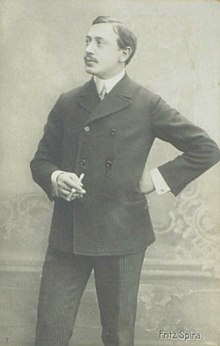Fritz Spira
Fritz Spira , born in Jakob Spira (born August 1, 1877 in Vienna , † 1943 in Ruma concentration camp , Yugoslavia), was an Austrian actor .
Life
Spira attended the Vienna Conservatory and began his artistic career as an operetta singer at the theaters of Olomouc and Troppau . In 1899 he first appeared at the City Theater of Wroclaw . In 1900 he received an engagement at the Theater in der Josefstadt in Vienna. In 1901 he came to Berlin, where he worked for three decades at various stages such as the Residenz Theater , the New Theater, the Small Theater, the Lustspielhaus , the Komische Oper and the Metropoltheater .
Since 1910, Spira was often used in silent films, but was mostly limited to small roles, even if he embodied high personalities such as Emperor Franz Joseph in 1926 The Third Squadron or the almighty governor in Sacco and Vanzetti .
After the seizure of power of the Nazis , he emigrated to Poland . His marriage to his wife, actress Lotte Spira , whom he married on December 20, 1905, was divorced in 1934. Spira played at the German-speaking city theater in Bielitz , Poland , where he became senior director. In 1935 he went to Austria, but as a Jew he could hardly find any job opportunities.
After the annexation of Austria , he tried in vain to escape abroad. While attempting to get a visa to Shanghai, he was arrested and deported in early March 1941. Spira probably came in the in the Vojvodina lying KZ Ruma killed. He is the father of the actresses Camilla Spira and Steffie Spira .
Filmography
- 1910: Pro Patria
- 1912: a song of life
- 1912: On the bottom of the sea
- 1913: The small residence
- 1913: Everything for love
- 1914: the pearl
- 1914: Second door on the left
- 1914: Miss Lieutenant
- 1916: The Citadel's tenth pavilion
- 1917: a song of life
- 1918: Ferdinand Lassalle - The people's tribunes happiness and end
- 1919: The envoy's secretary
- 1919: Free love
- 1920: The Princess' Cup
- 1922: Fridericus Rex
- 1923: friend Ripp
- 1925: Countess Mariza
- 1925: Free people
- 1925: love and trumpet blowing
- 1926: The red mouse
- 1926: The third squadron
- 1926: women of passion
- 1926: The trumpets are blowing (also: Husarenliebe)
- 1926: Nanette does everything
- 1926: Vienna - Berlin love game between Spree and Danube, Ein
- 1926: We are from K. u. K. Infantry Regiment
- 1927: On the Weser
- 1927: In the shadow of the electric chair
- 1927: Family day in the Prellstein house
- 1927: The dashing Archduke
- 1928: The fate of the Habsburgs
- 1928: Lace panties and Schusterpech / Lotte, the department store girl
- 1929: Nachtgestalten ( The Alley Cat )
- 1929: The fourth from the right
- 1930: who saw Bobby?
- 1930: On the edge of the Sahara
- 1930: The one from the fairground
- 1930: darling of the gods
- 1930: Rasputin, demon of women
- 1930: two worlds
- 1930: Va Banque
- 1930: On the edge of the Sahara
- 1931: Viennese love affairs / Didn't luck just pass by
- 1931: Service is service
- 1931: Her Highness commands
- 1931: I once loved a girl in Vienna
- 1931: The horror of the garrison
- 1931: Barracks magic
- 1931: As long as a Strauss waltz sounds
- 1931: Viennese love affairs
- 1932: The Feldherrnhügel
- 1932: The women's diplomat
- 1932: Gitta discovers her heart
- 1932: Johann Strauss, kuk Hofkapellmeister
- 1932: Johnny steals Europe
- 1932: Schubert's songs
- 1932: Kaiserwalzer
- 1933: The Leuthen Choral
- 1933: The night in the forester's house
- 1935: Diary of the beloved
literature
- D. Loibl: Spira Jacob Fritz. In: Austrian Biographical Lexicon 1815–1950 (ÖBL). Volume 13, Verlag der Österreichischen Akademie der Wissenschaften, Vienna 2007–2010, ISBN 978-3-7001-6963-5 , p. 31 f. (Direct links on p. 31 , p. 32 ).
- Kay Less : Between the stage and the barracks. Lexicon of persecuted theater, film and music artists from 1933 to 1945 . With a foreword by Paul Spiegel . Metropol, Berlin 2008, ISBN 978-3-938690-10-9 , p. 322.
Individual evidence
- ↑ Nanette does everything. In: Illustrierte Filmwoche 1926. Retrieved on May 9, 2020 .
Web links
- Fritz Spira in the Internet Movie Database (English)
| personal data | |
|---|---|
| SURNAME | Spira, Fritz |
| ALTERNATIVE NAMES | Spira, Jakob (maiden name) |
| BRIEF DESCRIPTION | Austrian actor |
| DATE OF BIRTH | August 1, 1877 |
| PLACE OF BIRTH | Vienna |
| DATE OF DEATH | 1943 |
| Place of death | Ruma concentration camp , Yugoslavia |

